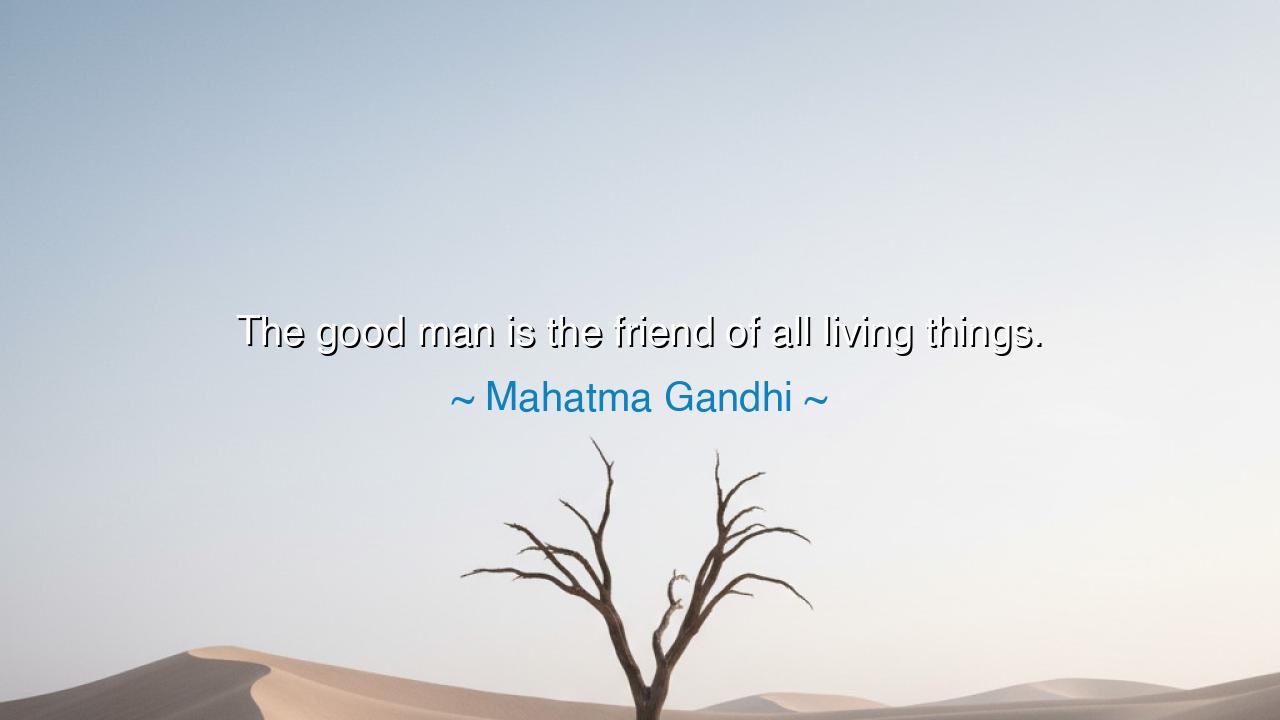
The good man is the friend of all living things.






Hear the words of Mahatma Gandhi, a prophet of peace and an architect of the soul, who declared: “The good man is the friend of all living things.” In this saying, he draws a circle so vast that nothing alive is excluded—no beast of the field, no bird of the sky, no man of any nation, no creature too small or too lowly. For Gandhi, the measure of goodness was not in riches, not in conquest, not in power, but in compassion: the heart that recognizes kinship with all life and seeks to protect it.
The meaning is this: to be truly good is to see beyond the narrow boundary of the self. Many men are kind only to those who resemble them, who share their tongue, their skin, their creed. But the good man is not bound by such limits. His friendship extends even to the voiceless and the powerless. He sees the sacred breath in every creature and honors it. In kindness to animals, in gentleness to children, in fairness to strangers, the goodness of a man is revealed. To be friend of all living things is to live in harmony with the eternal law that binds creation together.
Consider the life of Saint Francis of Assisi, who walked the earth centuries before Gandhi. He spoke to birds as brothers, he tamed a wolf with gentleness, he preached to men that all creatures are our kin. To him, the sparrow was as worthy of love as the prince, the lamb as worthy of respect as the priest. His life embodied Gandhi’s teaching long before Gandhi gave it voice: that true goodness flows outward in all directions, touching every living thing.
History also testifies in the work of Albert Schweitzer, the physician who coined the phrase “reverence for life.” He gave his life to healing the sick in Africa, not only among men but also caring for animals, insects, and plants. He believed, as Gandhi believed, that to injure life needlessly is to wound the great fabric of existence. His compassion for all beings made his name a beacon to those who would live by love.
Yet Gandhi’s words carry also a challenge. To be a friend of all living things is not easy. It demands sacrifice, restraint, humility. It requires us to curb cruelty, to resist greed, to walk softly upon the earth. It asks us to see even in the smallest creature a mirror of ourselves. Such a life may seem difficult in a world that prizes strength over mercy, but Gandhi reminds us that the highest strength is mercy itself.
O children of tomorrow, take this lesson as your guide: do not measure goodness by words alone, but by the reach of your compassion. Ask yourself: who is included in your circle of care? Only your family? Only your people? Or do you stretch your arms wider, until even the least of creatures finds shelter in your friendship? To widen your compassion is to widen your soul, and in that widening lies true greatness.
Therefore, let your practice be this: walk gently, consume mindfully, speak kindly. Defend the weak when you can, and do no harm where you cannot help. Treat animals with gentleness, nature with reverence, and fellow men with justice. In this way, you will not only honor Gandhi’s words—you will live them, becoming yourself a friend of all living things.
Thus the teaching endures: “The good man is the friend of all living things.” Let it remind you that goodness is not measured in temples or titles, but in the love that flows outward, unbroken, to embrace all life. For in befriending all, we become most fully human, and in compassion, we draw closest to the divine.






AAdministratorAdministrator
Welcome, honored guests. Please leave a comment, we will respond soon